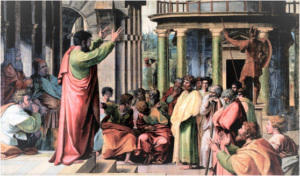
Teaching the Old Lessons
Mark White
 Every once in a while, some well-meaning but misguided brother will chide us for teaching the old lessons. He will say, “You are answering questions which no one is asking any longer.” By this, he means to squelch our teaching on the first principles of Gospel obedience and salvation by grace through faith; the nature, organization, and work of the church; Biblical morality; and the need for scriptural authority.
Every once in a while, some well-meaning but misguided brother will chide us for teaching the old lessons. He will say, “You are answering questions which no one is asking any longer.” By this, he means to squelch our teaching on the first principles of Gospel obedience and salvation by grace through faith; the nature, organization, and work of the church; Biblical morality; and the need for scriptural authority.
Of course, we understand that some people aren’t asking questions like, “What must I do to be saved?” as people did in Bible days (Acts 16:30). However, not everyone raised such an important question back then, either. Just because men ask the wrong questions, or they don’t ask any questions at all, does not mean that we must alter our teaching to accommodate the “felt needs” of the people of our time.
Haven’t people always clamored for something new, novel, different, and more exciting? Of course, we have. We do like to hear new things, even strange things. A skilled teacher of God’s word will be careful to “clothe old truths in new robes,” just as a good cook will find new and interesting ways to prepare and serve potatoes. Yet, the truth is still the truth. Its nature and essence never changes. We might present it differently, or we might approach the teaching of truth by some new methods, but in the end, the old truths will be clearly stated.
Older, more mature Christians must learn to be patient as the old lessons are taught again and again. There is always a new generation coming on or a new convert here and there who needs the lessons we think we know all too well. If we insist on teaching something novel and exciting, what will happen to the people who are yet untaught? Do they not now need the same lessons today’s mature Christians needed when they were novices? Judges 2:10 states of Israel, following the days of Joshua, “All that generation also were gathered to their fathers; and there arose another generation after them who did not know the LORD, nor yet the work which He had done for Israel.” Even Jeremiah encouraged the people of his day to ask for the “old paths” (6:16). However, most of the people to whom Jeremiah recommended this course rejected it and, as a result, ended up in a seventy-year captivity among the Babylonians. Jeremiah preached that the “good way” was to be found in the “old paths.”
It is no compliment to us when many of our young people in some churches have not even been given the opportunity of hearing the old lessons. It isn’t that they reject the teaching, they’ve just never been exposed to it! Elders and preachers who have served up the novel and new while neglecting the tried and true will pay for their negligence, to be sure. Besides, if someone is preaching something new and novel, shouldn’t that be examined closely to see whether it is indeed, truth? (Acts 17:11)
We must not grow weary of the old truths which distinguish the people of God. Spiritual ignorance will be the cause of our destruction both now and eternally. If we neglect the old lessons, the church which results, will lose its distinctiveness and the identity which God has given it.
________
The Wicked Vinedressers
Mike Johnson
 The Bible indicates that Jesus taught a great deal by parables. He would take something the people were familiar with and compare it to a spiritual truth to educate them. In His parables, Jesus discussed things such as planting seeds, baking bread, finding a hidden treasure, fishing, and losing sheep. He brought up everyday occurrences to instruct the people about the kingdom. The “Parable of the Wicked Husbandman” is a parable taught by Jesus in which He tries to get the people to see themselves. This parable is in three places in the Bible (Mt. 21:33-44, Mk. 12:1-12, Lk. 20:9-18). We will be looking primarily at Matthew’s account.
The Bible indicates that Jesus taught a great deal by parables. He would take something the people were familiar with and compare it to a spiritual truth to educate them. In His parables, Jesus discussed things such as planting seeds, baking bread, finding a hidden treasure, fishing, and losing sheep. He brought up everyday occurrences to instruct the people about the kingdom. The “Parable of the Wicked Husbandman” is a parable taught by Jesus in which He tries to get the people to see themselves. This parable is in three places in the Bible (Mt. 21:33-44, Mk. 12:1-12, Lk. 20:9-18). We will be looking primarily at Matthew’s account.
The Parable
Matthew 21:33 tells us, “. . . There was a certain landowner who planted a vineyard and set a hedge around it, dug a winepress in it and built a tower. And he leased it to vinedressers and went into a far country.” The verse shows that the landowner prepared the vineyard; he planted it and then put a hedge (wall- NASB) around it. Walls around vineyards were commonly made of thick thorn bushes, or the owner could construct them from wood or stone.
The householder then dug a wine press and built a tower. These were prevalent in vineyards of that time. In his commentary on Matthew, Albert Barnes points out, “In some Eastern countries at present, these towers are often 80 feet high and 30 feet square.” Finally, verse 33 points out that the landowner leased out his vineyard. The people who rented the vineyard would pay rent by giving the owner a portion of the fruit.
In verses 34-39, we read of problems that developed as the renters of the vineyard refused to pay the rent. The owner sent a servant to collect, and the renters beat him; he sent another whom they killed, and a third person he sent was stoned. They treated others who were sent in the same way. Finally, the owner decided to send his son, thinking they would respect him. (Mark’s account indicates it was his only son, and he is referred to as “beloved.”) The owner thought he would be respected, but, instead, they killed him, thinking they could acquire the son’s inheritance.
Application
The symbols of this parable seem very clear. The landowner represents God; the vineyard can be paralleled to the privileges of the Jewish nation, while the vinedressers symbolize the Jews. The Jews were God’s chosen people but frequently rebelled against Him. God sent the prophets to warn them, but they were often treated with contempt. For example, Jeremiah was stoned, Amos was murdered, and Isaiah was sawn asunder. Later, John was beheaded.
In the parable, the mistreatment of the servants represents the abuse directed toward the prophets of God throughout the years. Notably, the son sent to collect the rent symbolizes Christ. God lovingly sent His only Son to die for all. Christ, who was without sin and innocent, shed his blood for us. John 3:16 reveals, “For God so loved the world that He gave His only begotten Son, that whoever believes in Him should not perish but have everlasting life.” Romans 5:8 tells us, “But God demonstrates His own love toward us, in that while we were still sinners, Christ died for us.”
Cross-Examination
After presenting the parable, Jesus asked the chief priests and elders a question. The question was, “Therefore, when the owner of the vineyard comes, what will he do to those vinedressers?” They replied that the owner should destroy them and rent the vineyard to other vinedressers. Again, as in the Parable of the Two Sons, these people condemned themselves by their answer. Jesus addresses them further in verses 42-44. They realized that the Lord was rebuking them, but instead of repenting, sadly, they wanted to kill Him (45-46).
Many today hear the gospel message about God sending His Son to die for their sins and have a similar reaction. Instead of becoming Christians, they react with anger or indifference. Such people are acting like these unreasonable tenants.
__________
Three Responses to Paul’s Sermon
David Cox
 “And when they heard of the resurrection of the dead, some mocked, while others said, “We will hear you again on this matter.” So Paul departed from among them. However, some men joined him and believed, among them Dionysius the Areopagite, a woman named Damaris, and others with them” (Acts 17:32-34).
“And when they heard of the resurrection of the dead, some mocked, while others said, “We will hear you again on this matter.” So Paul departed from among them. However, some men joined him and believed, among them Dionysius the Areopagite, a woman named Damaris, and others with them” (Acts 17:32-34).
Paul had preached his sermon to the men of Athens at Mars Hill; he concluded by telling them that God commands all men to repent and then reminded them of the coming judgment. In verses 32-34, there are three responses from those who heard Paul.
- Some mocked him (v. 32). Luke says that some who heard Paul “mocked” him. They had heard Paul preach the truth of the gospel, but instead of accepting the preaching of Christ they were unwilling to change their lives to do what was acceptable to the will of God. There was a similar response of those on the day of Pentecost (Acts 2:13), they belittled or mocked the preaching of the apostles. It is a disposition like this that Paul mentioned to the Corinthians when he referred to people thinking the preaching of the cross as foolishness (1 Corinthians 1:18, 21).
- Some were wanting to hear more (v. 32). The second response is seen by those who heard and said, “We will hear you again on this matter.” They were not out-right refusing to listen to Paul, but they wanted to wait. Perhaps it was a difficult decision for some to hear the truth and obey it. They still desired to learn more, but they needed to respond. It is this disposition that Felix displayed (Acts 24:25). The parable of the ten virgins in Matthew 25 teaches the importance of not waiting because while we delay, our lives may end without being prepared.
- Some of them who heard believed (v. 34). There were some among those who heard Paul preach who believed. There were those that as Paul preached the of God, their hearts were pricked, and they responded and continued on in the work of the Lord.
The responses to Paul’s sermon were three-fold, and the reactions Paul encountered are the same responses people have today to the preaching of God’s word. What is our response to the preaching of the gospel? Do we mock the word of God by defying the necessity to obey or mock those who are striving to live right? Are we waiting to hear more? Are we ready to commit to obey and cleave to God’s word? Let us remember the lessons of God’s word and believe and obey Him now; not mocking or waiting until a convenient time.
__________
Buy the Truth & Sell It Not
Mike Johnson
Proverbs 23:23 says, “Buy the truth, and sell it not . . .” This passage shows the extreme value of truth. We are to spare no pains or costs to obtain it; once we have it, we are to keep it safe. We should not be reasoned or laughed out of it, nor allow events in life to drive it from us.
Why is the truth of God’s Word so valuable? John 8:32 says, “And ye shall know the truth, and the truth shall make you free.” Truth frees us from the love, the practice, and the guilt of sin. This concept is so crucial because the wages of sin equals death (Rom. 6:23). In John 17:1, Jesus prayed to God for His disciples, saying, “Sanctify them through thy truth: thy word is truth.” Peter pointed out that our souls are purified by obeying the truth (I Pet. 1:22).
We should find the truth of God’s Word and adhere to it; we should never accept anything less than truth. We should be willing to pay any price to obtain it; when we have it, we cannot take anything for it.
__________
Ten Lessons to Instill in Children
- If you’re thankful, show it (Luke 17:11-18).
- If you love someone, tell them (John 15:12).
- If you’re wrong, fess up (James 5:12).
- If you’re confused, ask questions (James 1:5).
- If you learn something, teach others (Colossians 3:16).
- If you’re stuck, ask for help (Matthew 7:7).
- If you make a mistake, apologize (Matthew 5:23-24).
- If you trip, get back up (Psalms 37: 23-24).
- If someone needs help, help them (Galatians 6:2).
- If you see wrong, take a stance (Ephesians 6:14).
Author Unknown
_____________________________________________
Sermon
Audio
The Cross, Crux of Christianity
6-13-04
Ralph Walker
====================================================
Editor: Mike Johnson

